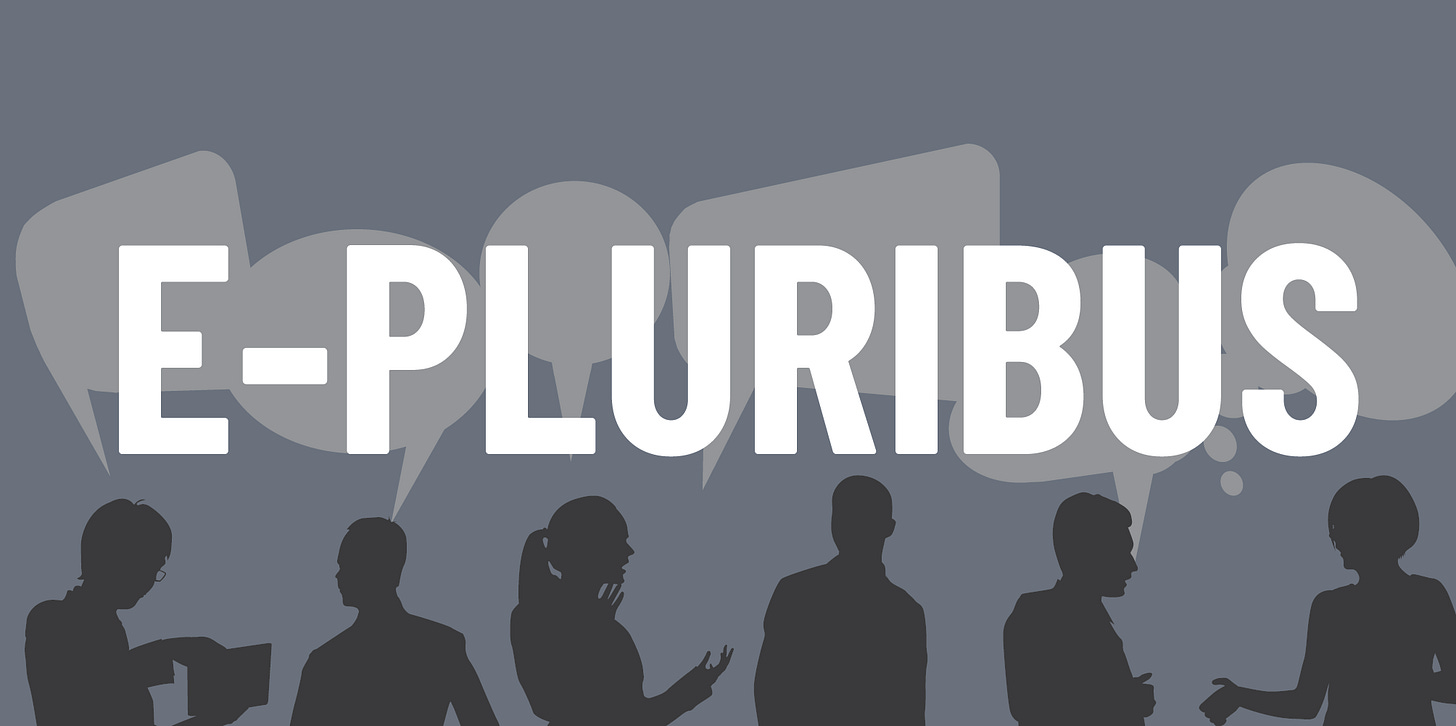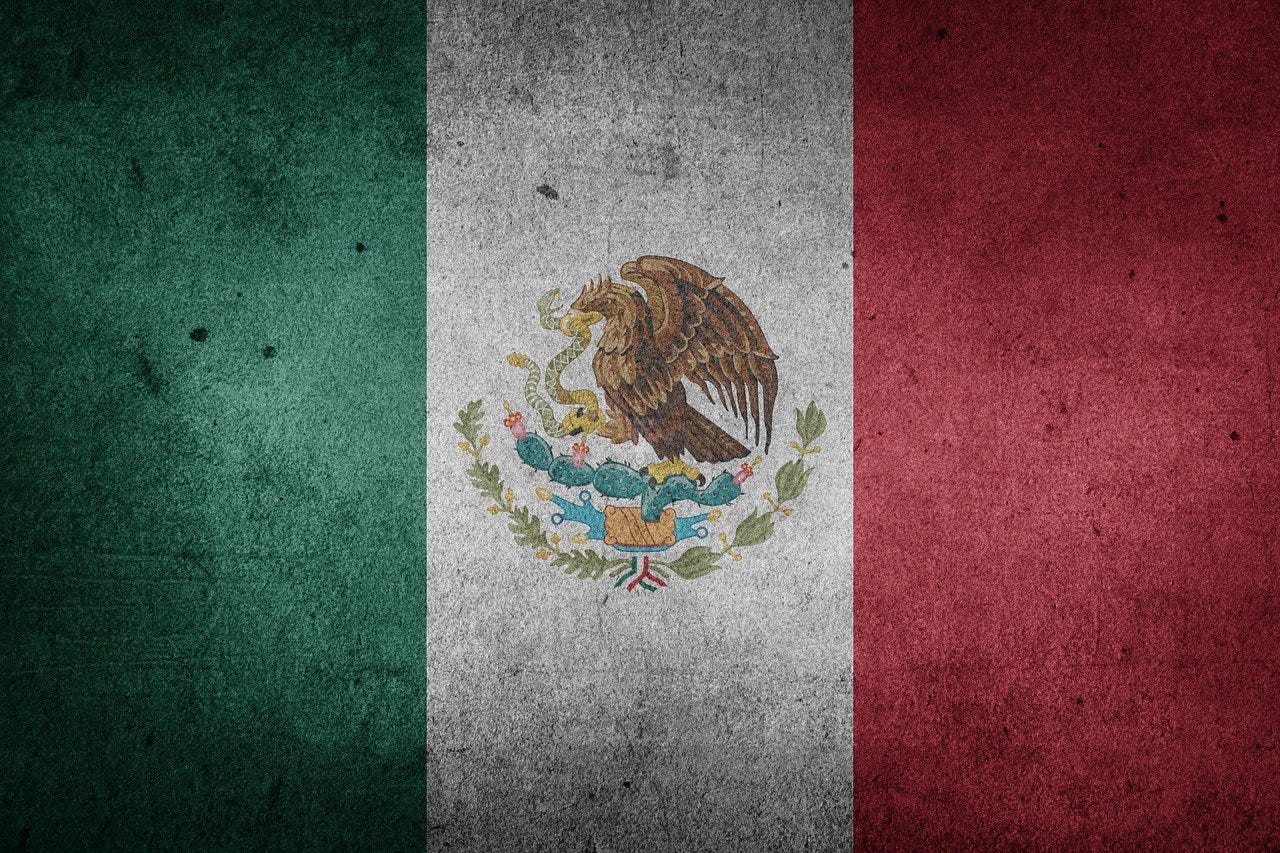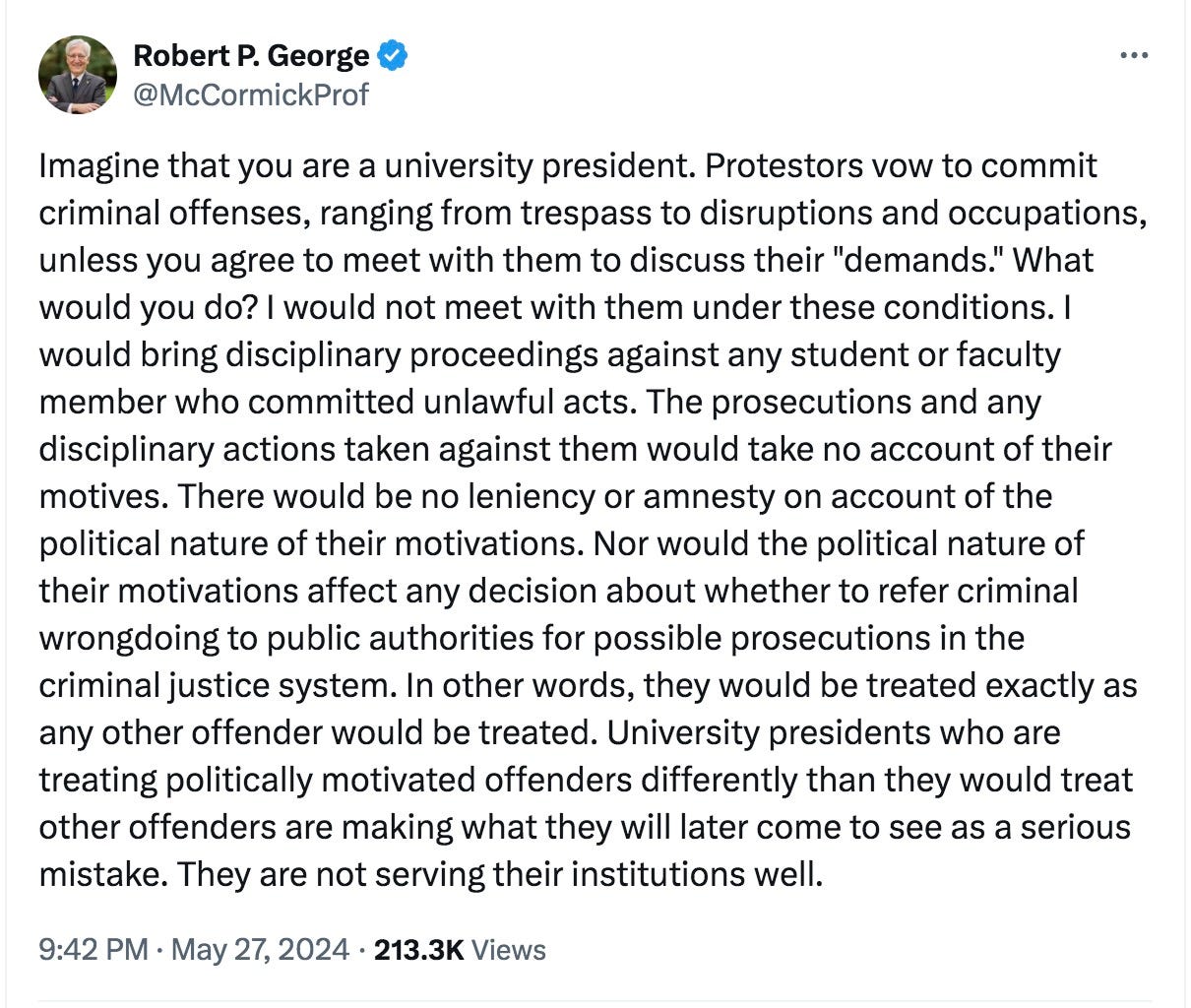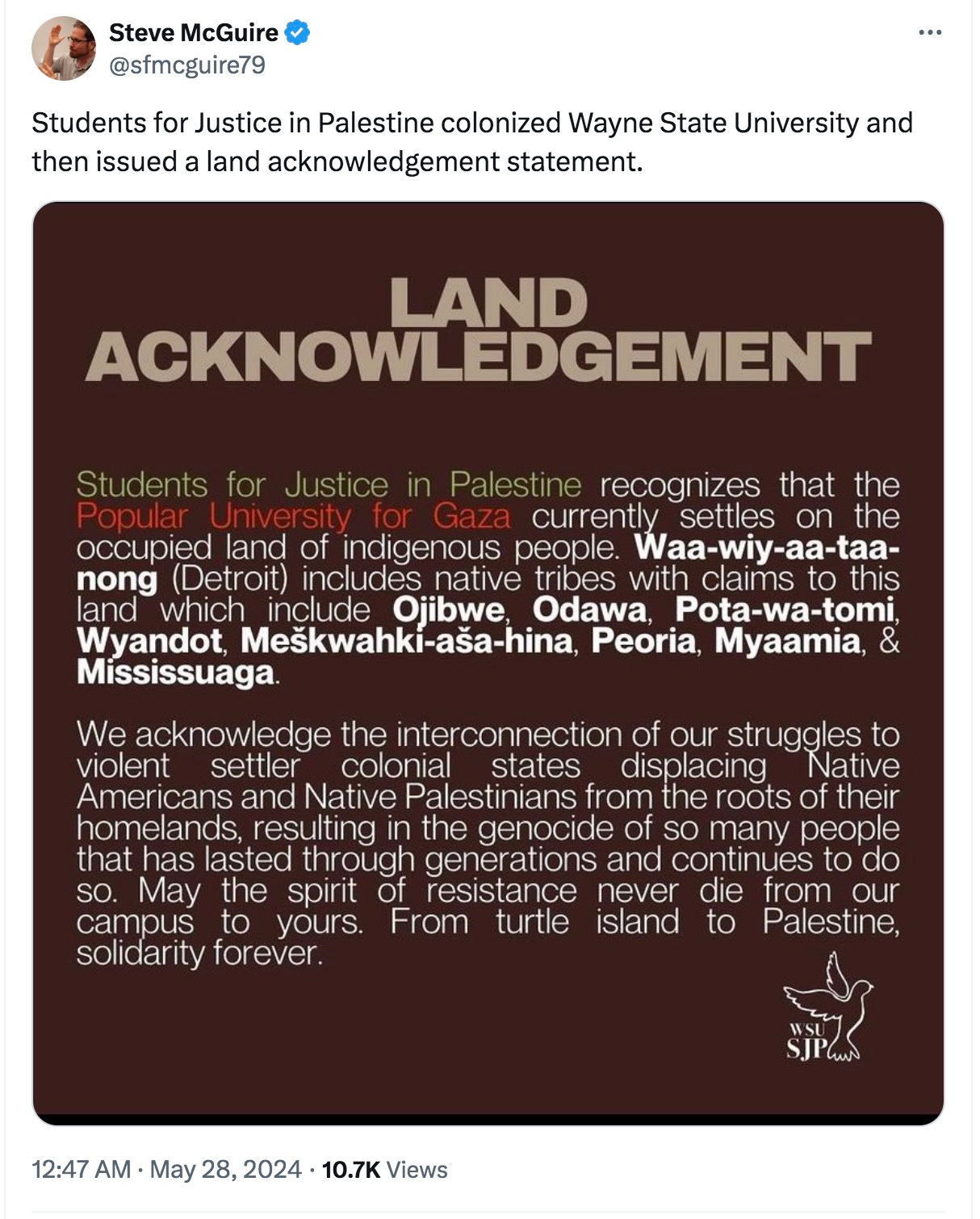E-Pluribus | May 28, 2024
DEI: the good, the bad and the unconstitutional; what the left could learn from the right; and Mexico's democracy is in trouble.
A round-up of the latest and best musings on the rise of illiberalism in the public discourse:
FIRE: DEI in higher ed: When it’s constitutional and when it’s not
The Foundation for Individual Rights & Expression keeps a close on university policies that affect free speech and expression rights. In a recent post on its website, FIRE explains what is meant by DEI (“diversity,” “equity,” and “inclusion”) and how schools generally run afoul of the constitution when attempting to institute those values.
Universities have a right to define and adopt institutional values aimed at becoming more successful institutions of higher learning. However, there’s a risk of going too far in how those values are applied, which can quickly lead to free speech and academic freedom violations on campus. Efforts to combat these excesses can also threaten free expression and free inquiry. What’s more, in addition to being a set of ideas or practices, DEI is also big business — and there are times where the interests of that business do not align with the mission of higher education.
[. . .]
The terms “diversity,” “equity,” and “inclusion,” at least as they are commonly defined and understood, generally stand for values of tolerance, fair treatment, and pluralism that most Americans share and wish to uphold.
Many American colleges and universities explicitly endorse these values in their commitment to DEI. Harvard, for instance, notes that its emphasis on diversity “is rooted in our fundamental belief that engaging with unfamiliar ideas, perspectives, cultures, and people creates the conditions for dramatic and meaningful growth.”
[. . .]
FIRE only takes a position on DEI efforts (as well as responses to it) if they implicate free speech, academic freedom, or establish an orthodoxy in higher ed. The two worst ways it can do this is by either restricting speech or by compelling it.
There has been plenty of restrictive DEI-related speech policing on campus in the form of words you can’t say, opinions you can’t voice, and ideas you can’t engage with. But there are also clear incidents of administrators, in the name of DEI, dictating things you must say and ideas you must agree with on the threat of discipline, termination, or loss of professional opportunities. These pressures often come in the form of DEI statements, curricular assessments, DEI standards used for faculty hiring, promotion, and tenure, and more.
[. . .]
When the government tries to regulate what ideas, concepts, and topics can be taught and talked about in college classrooms, they threaten the free speech rights of students and faculty — and there have been many attempts in recent years to do just that.
[. . .]
There is a world of difference between legitimate efforts to reduce speech-chilling bureaucracy — such as MIT banning diversity statements in faculty hiring — and politically-motivated attempts to restrict what students or faculty can say. And there’s no better example of the latter than Florida’s “Stop WOKE Act.”
Officially called the “Individual Freedom Act,” the statute seeks to suppress certain perspectives and ideas on campus that the government deems inappropriate. This includes discussions related to racial or sex-based bias, whether values such as “merit” or “colorblindness” are racist, and whether certain groups experience “privilege” on the basis of their sex or skin color.
The Stop WOKE Act’s vague language and overbroad restrictions would require faculty to censor guest speakers and avoid even the mere discussion of topics like racism, or else face potential discipline or termination. As a federal court opined when it struck down key elements of the law, this is a “positively dystopian” violation of both students’ and faculty’s First Amendment rights.
Read it all here.
Ruy Teixeira: The Right Stuff for the Left
At the Liberal Patriot, Ruy Teixeira has some advice for the left: try some diversity. He doesn’t use those exact words, but the gist of Teixeira’s observations is that everyone on the left having to agree with everyone else on the left (intersectionality gone wild) isn’t a workable game plan.
The progressive movement emerged over the past two decades out of a series of component groups representing causes like civil rights, environmentalism, abortion rights, and labor. Over the past two decades, these groups, sometimes called “The Groups,” have evolved from a patchwork of atomized single-issue organizations into a relatively unified movement. Each component part now habitually supports the projects of the others: Abortion-rights groups endorse defunding the police….
Since their goals are both to move the Democratic Party leftward and to hold together the progressive coalition, it follows that criticism from liberals poses a significant strategic threat. “Too often, liberals seek to legitimize their positions by punching left, distancing themselves from social movements to make themselves appear reasonable by comparison, which only strengthens the hands of conservatives and pulls the political center to the right,” they write, urging liberals to instead accept “the necessity of working in coalition with progressive social movements.”
Which presumably means accepting whatever these self-appointed tribunes of the people in The Groups have to say about any given issue, no matter how absurd. Can’t punch left after all!
Madness. Underneath this power play to silence critics is a noxious ideology that fits epistemic closure like a glove. This ideology—call it “intersectionalism”—judges actions or arguments not by their content but rather by the identity of those involved in said actions or arguments. Those identities in turn are defined by an intersectional web of oppressed and oppressors, of the powerful and powerless, of the dominant and marginalized. With this approach, one judges an action not by whether it’s effective or an argument by whether it’s true but rather by whether the people involved in the action or argument are in the oppressed/powerless/marginalized bucket or not. If they are, the actions or arguments should be supported; if not, they should be opposed.
This approach was always a terrible idea, in obvious contradiction to logic and common sense. It has not improved with age. It has led much of the left and large sectors of the Democratic Party to take positions that have little purchase in social or political reality and are offensive to the basic values most people hold—and to be impervious to criticism about them.
Read the whole thing.
Enrique Krauze: Mexican Democracy Hangs In The Balance
Many Americans are frustrated with Mexico’s seeming inability to control its drugs cartels and its borders. But if Mexico’s admittedly flawed democracy collapses, a bad situation could get much worse, not just for Mexico but for the US as well. Enrique Krauze at Persuasion provides a look at Mexico’s upcoming elections and what’s at stake.
On June 2, Mexico will hold its most important election in recent history. At stake is not only the presidency, and assorted political offices, but, in all likelihood, the very survival of Mexican democracy. The current president, Andrés Manuel López Obrador, intends to cement his legacy by passing power on to a handpicked successor—and, in so doing, threatens to restore and extend Mexico’s long-time tradition of single-party rule. In a significant sense, what is on the table in Mexico’s election is even more damaging to democracy than what Mexicans got used to in the bad old days of Partido Revolucionario Institucional (PRI) rule. Then, presidents enjoyed power while in office but did not “own” their party. With López Obrador (commonly known as AMLO), Mexico may be facing unknown terrain: a political figure whose power extends well beyond a six-year term limit.
To understand what is in play in the June election, it is worth having a primer on Mexican political history. Between 1929 and 2000, Mexican presidents—all of them PRI—enjoyed near absolute power while in office. Thousands of executive and legislative posts in the 32 states and over 2000 municipalities were periodically distributed within the party, which never suffered a serious challenge to its power. This was the “Mexican Political System,” which Mario Vargas Llosa famously called “The Perfect Dictatorship.”
The system had few external boundaries (opposition parties were almost entirely symbolic, the government managed elections, civic awareness was limited, and freedom of expression was restricted), but there were internal limits: The president did not dominate the PRI. His greatest privilege was to choose his successor, a rule fulfilled every six years from 1934 onwards. The outgoing president left power enjoying impunity and immunity, but the incoming president governed without any obligation to obey the previous one, often resulting in distance or even rupture. It was “the King is dead, long live the King.”
The system remained untouched until the end of the 1980s. Influenced by the winds of change in Europe and Latin America, the PRI lost its sustenance and legitimacy. Bowing to the inevitable, President Ernesto Zedillo (1994-2000) initiated reform: He ensured the independence of the Federal Electoral Institute, refused to appoint his successor, opened competition among parties, restructured the Supreme Court to give it full autonomy, and respected freedom of expression. The victory of Vicente Fox, the candidate of the center-right National Action Party (PAN), marked Mexico’s peaceful and orderly transition to democracy in 2000.
Two PAN and one PRI government came next, with poor or mediocre results. In opposition, Andrés Manuel López Obrador, then a populist candidate from the left who publicly spoke of himself as a redeemer and even compared himself with Jesus Christ, refused to acknowledge his defeat in 2006, called himself the country’s “legitimate president,” and then claimed fraud, again, in 2012. He finally won the presidency in 2018 with a clear majority of 53%. Unlike the PRI presidents, AMLO is the owner of his party, Morena. Morena, as opposed to the old PRI, is not a party but a movement around a caudillo. It is no coincidence that AMLO acts as the owner of Mexico.
[. . .]
Mexican democracy is not only young but inexperienced. In two hundred years of independence, Mexico has tried genuine democracy in only two other periods: the liberal era of Benito Juárez (1867-1876) and the fifteen months of President Francisco I. Madero (1911-1913). The first period ended in dictatorship, the second led to revolutionary violence. Since 2000, we have been in the third iteration of Mexican democracy—the result of the hard work of Mexicans who over many decades fought for political rights and liberties. It would be a serious historical setback to lose those gains now.
Read it all.
Around Twitter (X)
Via the Foundation for Individual Rights & Expression, Harvard takes a step towards institutional neutrality:
Princeton professor Robert P. George has some thoughts on university presidents caving to what is essentially extortion:
And finally, Students for Justice in Palestine acknowledge their own occupation of someone else’s land. Heartwarming!











